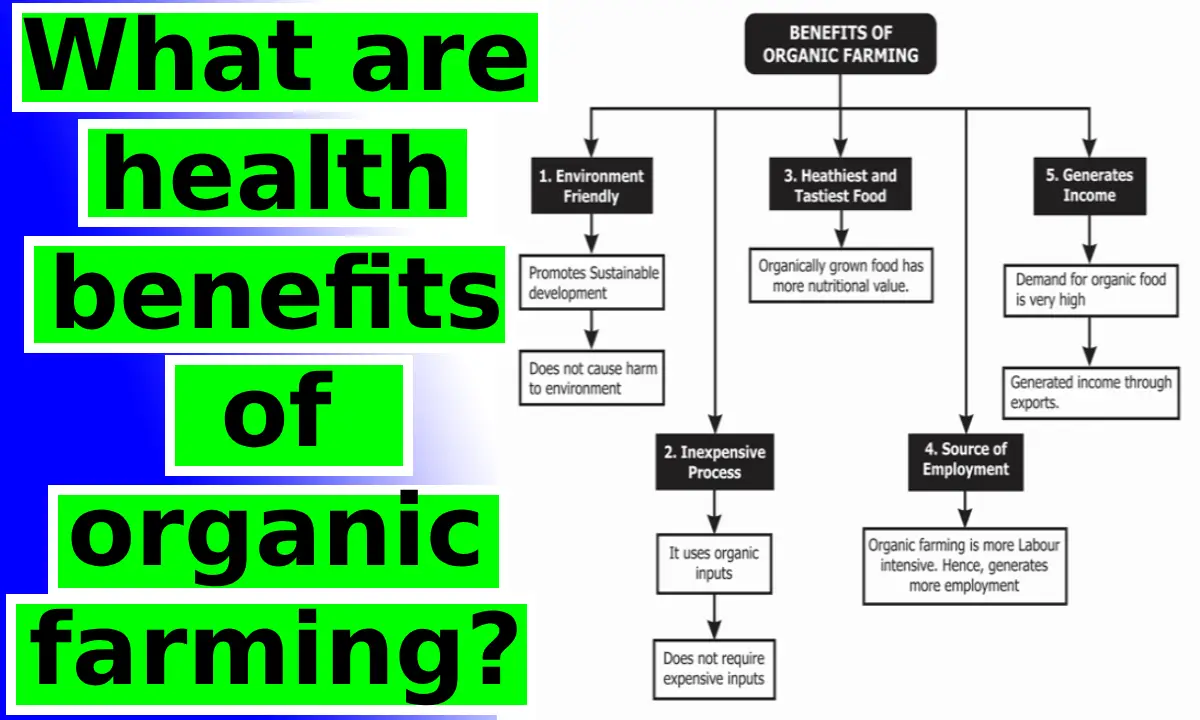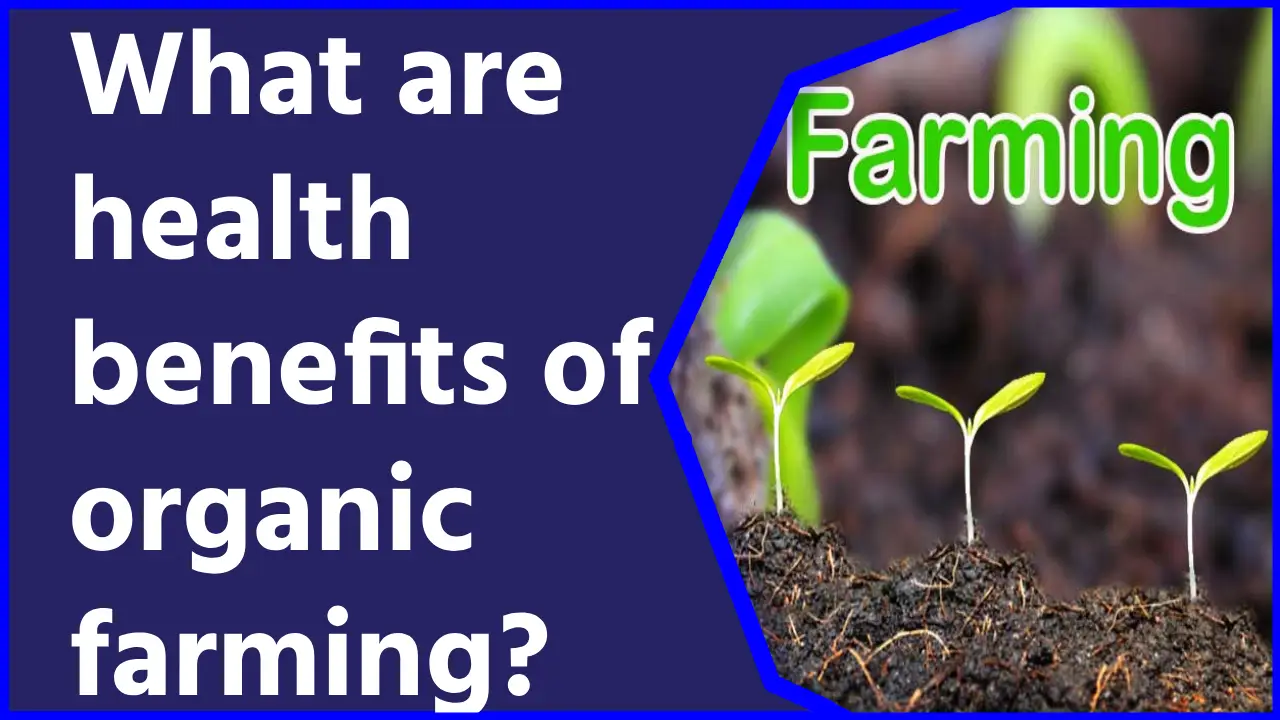What are health benefits of organic farming: Organic farming represents a methodology for cultivating crops using natural approaches, abstaining from the application of chemical fertilizers, pesticides, and growth hormones. It champions the adoption of eco-friendly practices such as green manure, biological pest control, and crop rotation to ensure sustainable agriculture.
Advantages of embracing organic farming:
In India, the advantages of organic farming encompass several key aspects:
- Mitigation of soil and water pollution by eliminating the use of harmful chemicals.
- Preservation of disease-resistant and diverse biodiversity, contributing to healthier ecosystems.
- Cost-effectiveness owing to the utilization of natural resources.
- Maximization of resource utilization, enhancing the overall efficiency of this farming method.
Integrated organic farming: What are health benefits of organic farming?
Integrated organic farming represents a holistic approach that revolves around utilizing waste from one process as a nutrient source for another. This methodology aims to establish self-sustaining systems, minimizing resource wastage and waste generation while optimizing outputs.
For instance, a series of interlinked processes, such as bee-keeping, water harvesting, dairy management, composting, and agriculture, form the crux of integrated organic farming. Here’s how the process chain unfolds:
Read Also:-What are the Benefits of wellhealthorganic vitamin b12 in 2024.
- Crop wastes and cattle dung are converted into natural fertilizers through composting.
- The natural gas generated from composting can effectively fulfill the farm’s energy needs.
- Harvested water is used for irrigation purposes.
- The farm generates ample fodder for cattle.
- Bees play a pivotal role in crop pollination, contributing to enhanced crop yields.
Hence, integrated organic farming emerges as a sustainable and feasible practice in India, fostering efficient resource management and environmental conservation.
Health Benefits of Organic Farming

Organic farming has surged in popularity owing to its numerous health benefits. This agricultural practice focuses on natural techniques, avoiding synthetic chemicals and genetically modified organisms (GMOs). Let’s delve into the significant health advantages associated with organic farming methods.
Enhanced Nutritional Value in Organic Produce
Organically grown fruits, vegetables, and grains often boast higher nutrient levels compared to conventionally produced counterparts. Studies suggest that organic produce contains elevated concentrations of essential vitamins, minerals, and antioxidants. For instance, organic fruits and vegetables exhibit increased levels of vitamin C, iron, magnesium, and phosphorus, contributing to a more nutrient-dense diet.
Reduced Exposure to Harmful Chemicals
One of the primary health advantages of consuming organic food is the limited exposure to synthetic pesticides and herbicides. Conventional farming involves the application of various chemicals, leaving residues on produce that pose health risks. In contrast, organic farming relies on natural fertilizers and biological pest control methods, minimizing the use of potentially harmful substances.
Lower Pesticide Exposure
Consuming organic food diminishes the intake of synthetic pesticides, linked to adverse health effects like respiratory issues, neurological disorders, and certain cancers. Opting for organic produce reduces pesticide exposure, promoting a healthier lifestyle.
Improved Overall Health and Well-being
A diet rich in organic food has shown associations with enhanced overall health and well-being. Organic farming prioritizes soil health and biodiversity, resulting in nutrient-rich, flavorful produce. Some consumers report increased energy levels, improved digestion, and strengthened immune function after switching to organic foods.
Comparison: Organic vs. Conventional Farming
Health Implications of Farming Methods – What are health benefits of organic farming?
The comparison between organic and conventional farming methods reveals substantial differences in their impact on human health. Conventional farming heavily relies on synthetic chemicals like pesticides and herbicides, which can potentially pose health risks through residue accumulation on crops. In contrast, organic farming prioritizes natural techniques, reducing exposure to harmful substances.
Scientific Evidence Supporting Organic Benefits – What are health benefits of organic farming?
Numerous scientific studies have emphasized the health advantages of consuming organic produce. Research indicates that organic food contains lower levels of pesticide residues, antibiotics, and heavy metals, thereby reducing the risk of health complications linked to these substances. Moreover, organic farming methods promote the production of food with higher nutrient content, contributing to improved health outcomes.
Supporting Local Communities through Organic Farming
Economic Advantages –
Organic farming plays a crucial role in supporting local economies by fostering sustainable agricultural practices. By promoting small-scale farming and local markets, organic agriculture creates job opportunities and stimulates economic growth within communities. Moreover, it encourages fair trade practices, benefiting both farmers and consumers.
Community Empowerment –
Organic farming fosters a sense of community by encouraging direct interaction between producers and consumers. Farmers’ markets and community-supported agriculture (CSA) initiatives enable consumers to connect with local farmers, fostering a sense of trust and accountability. This direct relationship empowers communities to make informed choices about the food they consume and the farming practices they support.
Challenges and Misconceptions
Obstacles Faced by Organic Farmers –
Despite its benefits, organic farming faces several challenges. Farmers transitioning to organic practices may encounter initial difficulties in adapting to new methods and overcoming financial constraints. Additionally, competition from large-scale conventional farming and limited access to resources pose obstacles for organic farmers.
Common Myths Surrounding Organic Farming –
Several misconceptions persist regarding organic farming, including beliefs that organic food is less nutritious or unaffordable. However, scientific evidence refutes these notions, demonstrating that organic produce often contains higher nutrient levels and can be affordable, especially when considering long-term health benefits.
Certifications and Standards – What are health benefits of organic farming?
Overview of Organic Certifications –
Organic certifications ensure that food meets specific standards and regulations set by governing bodies. These certifications verify that products labeled as “organic” comply with established criteria, including the use of natural fertilizers, absence of synthetic chemicals, and adherence to sustainable farming practices.
Importance of Adherence to Standards –
Adhering to organic standards is vital for maintaining the integrity of organic products. Consumers rely on certifications to make informed choices about the food they purchase, emphasizing the importance of strict adherence to organic farming guidelines by producers.
This section continues further into the article’s outline, covering additional subtopics related to the health benefits of organic farming. If you’d like to explore more or focus on specific aspects, please let me know!
Rising Consumer Awareness and Demand
Increasing Interest in Organic Products –
Consumer interest in organic products has been on the rise due to growing awareness of health and environmental concerns. Many individuals are increasingly conscious of the benefits associated with organic food, such as reduced exposure to harmful chemicals and supporting sustainable farming practices.
Factors Driving Consumer Demand –
Several factors contribute to the increasing demand for organic produce. Concerns about food safety, environmental sustainability, and personal health drive consumers to opt for organic options. Additionally, a shift toward healthier lifestyles and ethical considerations regarding animal welfare and the environment influence consumer choices.
Tips for Embracing an Organic Lifestyle
Practical Steps for Transitioning to Organic Farming –
For individuals looking to adopt an organic lifestyle, there are various practical steps to consider. Starting with small changes, such as buying organic produce, supporting local farmers’ markets, and growing a small garden using organic methods, can gradually transition individuals toward embracing organic practices.
Case Studies and Success Stories
Highlighting Successful Organic Farming Initiatives –
Numerous successful organic farming initiatives worldwide serve as models for sustainable agriculture. These initiatives showcase innovative methods and demonstrate how organic farming positively impacts communities, ecosystems, and public health. Case studies offer valuable insights into the tangible benefits of embracing organic practices.
Positive Impacts on Health and the Environment –
Case studies and success stories emphasize the positive outcomes of organic farming. They showcase increased crop diversity, improved soil quality, reduced environmental pollution, and the overall positive impact on the health and well-being of both consumers and farmers.
Future Trends in Organic Farming – What are health benefits of organic farming?
Technological Advancements in Organic Agriculture –
Advancements in technology continue to revolutionize organic farming. Innovations in precision agriculture, sustainable farming techniques, and the use of data analytics are expected to further enhance productivity and sustainability in organic food production.
Predictions for the Future of Organic Farming –
The future of organic farming appears promising, with an increasing focus on sustainability, technological advancements, and consumer demand for healthier and environmentally friendly food options. Anticipated developments include improved farming practices, increased accessibility to organic products, and greater awareness of its benefits.
Government Support and Policies
Role of Governmental Policies in Promoting Organic Agriculture –
Governmental support plays a crucial role in promoting organic farming. Policies that incentivize organic practices, provide financial support, and offer educational resources encourage farmers to adopt sustainable methods. Government initiatives contribute significantly to the growth of the organic farming sector.
National Initiatives Supporting Organic Farming –
Many countries have implemented programs and initiatives to support organic agriculture on a national scale. These initiatives include research funding, educational campaigns, subsidies for organic farmers, and the establishment of standards and regulations to ensure the authenticity of organic products.
Conclusion: What are health benefits of organic farming?
In conclusion, the health benefits of organic farming are substantial and wide-ranging. From nutritional superiority and reduced exposure to harmful chemicals to environmental sustainability and community empowerment, organic farming promotes healthier lifestyles and supports a more sustainable future.
FAQs: What are health benefits of organic farming?
- Is organic food always more expensive?Organic food is often perceived as more expensive than conventionally produced food. The higher prices can be attributed to various factors such as the costs associated with organic certification, lower crop yields due to more labor-intensive farming practices, and limited economies of scale compared to conventional farming. However, prices may vary depending on the region, availability, and specific types of organic produce. Despite the price difference, many consumers prioritize organic food due to its perceived health and environmental benefits.
-
Are there any specific health risks associated with conventional farming practices?
Conventional farming practices involve the use of synthetic pesticides, herbicides, and chemical fertilizers, which can pose health risks. Pesticide residues on produce have been linked to various health issues, including potential carcinogenic effects, developmental problems in children, and disruptions to the endocrine system. Furthermore, the intensive use of antibiotics in conventional livestock farming can contribute to antibiotic resistance, posing risks to human health.
-
Can organic farming methods help combat climate change?
Yes, organic farming methods can contribute to mitigating climate change. Organic farming prioritizes soil health through practices like crop rotation, composting, and reduced tillage. These methods enhance soil organic matter, which sequesters carbon dioxide from the atmosphere. Additionally, organic farms often utilize fewer synthetic inputs and focus on biodiversity, which can help reduce greenhouse gas emissions associated with conventional agricultural practices.
-
Are organic foods completely free from pesticides?
While organic farming restricts the use of synthetic pesticides, it does not mean that organic foods are entirely free from pesticides. Organic farmers use natural pesticides derived from plants, minerals, or biological sources. These natural pesticides are permitted under organic regulations and are considered safer than synthetic chemicals. Organic farming aims to minimize pesticide use and promote safer alternatives to protect human health and the environment.
-
How can consumers ensure they’re purchasing genuine organic products?
To ensure the authenticity of organic products, consumers can look for reputable organic certifications and labels on food packaging. Certifications such as USDA Organic, EU Organic, or other country-specific organic labels guarantee that the product meets established organic standards. Additionally, purchasing from trusted sources, such as certified organic farmers’ markets, organic food stores, or directly from certified organic producers, can provide assurance about the authenticity of organic products.
If you have any further questions or need more information on organic farming or related topics, feel free to ask!
- What are health benefits of organic farming pdf,
- 5 benefits of organic farming,
- 10 benefits of organic farming,
- benefits of organic products on human health,
- benefits of organic farming on the environment,
- 9 amazing benefits of organic food,
- organic vs non organic food study,
- benefits of organic food pdf,








